
Sponsored Ads
|
Articles by this Author
»
(E,H) Pixeltown in your town Book Signing by Marija Miletic Dail
|
Pixletown "book signing" 8-og travnja 2006 u San Pedru Pixletown "book signing" April 8th 2006 in San Pedro
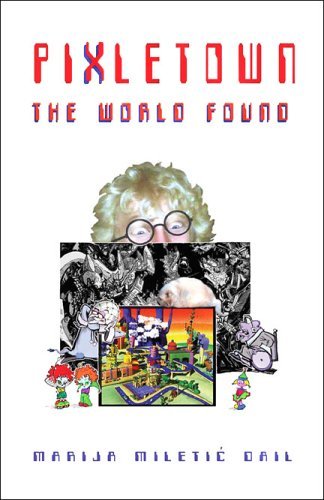
Marija Miletic Dail will have her "Pixletown- the World Found" book signing at the Croatian Cultural Center, 510 7th street in San Pedro - on the 8th of April at 4 PM. She will talk about the book as well as about her career as an animator, director and producer of animation in all of the major studios in Hollywood. The book will be sold at half the price at the signing. Snack and refreshments will be served. All are welcome! Marija Miletic Dail ce imati "book signing" 8-og travnja u Hrv. Kult. Centru u San Pedru u 4 PM sa zakuskom i picem.Knjiga se zove "Pixletown - the World Found". Moze je se kupiti preko Amazon.com i u Borders book stores, no ja cu je imati u San Pedru u pola cijene, ali to je samo za vrijeme potpisivanja. Ja inace ne prodajem knjigu, vec knjizare i Amazon.com. Pokazivat cemo par mojih kratkih filmica ;"Red rock" i "Kolo", a mozda i "Why not?".
Why not?
Svi su dobro dosli, dapace neka nas dodje sto vise. Imam jos jednu vijest: Ako Bog da, na ljeto cu otici u Europu rezirati 78 kratkih filmova za Slovensko/francusku produkciju; sa boravkom u Parizu, te Ljubljani i Zagrebu. Trajat ce blizu dvije godine. To je za sada sve - hvala Ti na usluzi.
Drz se, Nenade i pozdrav od Marije Miletic Dail Order directly from Amazon, by clicking below: Editorial Reviews
Book Description
Born in Zagreb, Croatia, Marija studied art and worked as an illustrator for the daily newspapers, while still in high school. Her animation career had its beginning at the “Zagreb Film” studio, which “infected” her with enough enthusiasm to last her a lifetime. Daughters Mirna and Vera, the “apples of her eye”, provided her with six beautiful grandchildren and enough stories for another lifetime. Marija spends her time between Carmel Valley and Zagreb, with her artist husband Dr. Sukhdev Singh Dail. “There is nothing new under the sun” has been quoted thousands of times in the centuries past. However, there was something “new” on the horizon, just waiting to be “discovered,” or simply, brought into the light. Such is the case in the story of Pixletown, where a whole world existed, and even thrived, undiscovered for eons, until this century, when the vehicle had been invented to bring it to our attention. That vehicle was the computer. Marija Miletic Dail www.marijamileticdail.com/ http://www.imdb.com/name/nm0587286/
|
»
(E) WEEKLY BULLETIN 8, 2006 Croatian Embassy in Washington DC
»
(E) Actavis Makes $1.6 Billion Bid to Buy Croatia's Pliva
|
Actavis Makes $1.6 Billion Bid to Buy Croatia's Pliva
March 17 (Bloomberg) -- Actavis Group Fh, an Icelandic generic-drug company, said it offered to buy Croatian rival Pliva d.d. for about $1.6 billion to form the world's third- largest maker of copycat treatments.
The 570 kuna-a-share offer is about 35 percent more than the average Pliva stock price in the last three months, Reykjavik- based Actavis said today in a statement on its Web site.
Drugmakers are buying rivals as demand for copycat medicines rise. Israel's Teva Pharmaceuticals Industries Ltd. acquired Miami-based generic maker Ivax Corp. in January for $7.6 billion, while Switzerland's Novartis AG grabbed a leading position in the generics market when it purchased Hexal AG and Eon Labs Inc. in 2005.
``Geographically, it makes a lot of sense for Actavis and Pliva to hook up,'' said Frances Cloud, an analyst at Nomura Code Securities in London. ``By and large, Pliva is fairly strong where Actavis is fairly weak.''
Pliva's global depositary receipts soared 12 percent, or $1.99, to a six-year high of $18.50 at 1:22 p.m. in London. Actavis rose 1.3 kronur, or 2.2 percent, to 60.5 kronur.
Marija Mandic, a spokeswoman for Zagreb-based Pliva, said she hadn't heard about Actavis' statement and didn't offer any immediate comment. Actavis spokesman Halldor Kristmannsson didn't immediately return calls for comment.
``Croatia would become the hub for Central and Eastern Europe and a key centre for future R&D and manufacturing, providing significant support for all of our other international markets,'' Chief Executive Officer Robert Wessman said in the statement. ``There would also be an important role for the Pliva brand, which has a fantastic heritage in established markets.''
Generic drugs work the same way as branded medicines. Because their makers spend less on research and marketing, the copycats often sell for less than half the price of brand-name equivalents.
To contact the reporter on this story:
Alex Kuli in Budapest at celser@bloomberg.net.
Last Updated: March 17, 2006 08:39 EST
|
»
(E) Zagreb Fair: an essential European marketplace since 1909
|
Zagreb Fair: an essential European marketplace
Established in 1909, the Zagreb Fair was one of the first fairs in Central Europe. Today the event is celebrating its 95th anniversary, said Zagreb Fair representative Mirjana Leskovic, during a speech she gave at the Mercure Korona Hotel in late February. Leskovic told her audience about the fair’s history as well as its activities.
In 1990, the City of Zagreb became a member of the World Trade Centers Association (WTCA), the most important world business family with approximately 300 members from more than 80 countries. Zagreb Fair organizes around 30 events annually, 16 of which carry the UFI (Union of International Events) symbol. It hosts over 7,000 exhibitions from 70 countries and regularly attracts over 700,000 visitors annually. This year’s activities started in January with PRIME, an international marketing event. February hosted “Fashion and Beauty Days” as well as the “Zagreb Sports and Boat Show.” Exhibitions such as “Etnogastronomy and Tourism as well as the “Zagreb Auto Show” are organized in March, while the “Construction and Equipping” exhibition will take place in April. The most significant multi-industry trade fair in Central Europe, Zagreb International Fall Fair, organized in September, is an exhibition focused on central economic happenings in Central and southeastern Europe. Among the exhibitors, Hungary had the strongest participation in this fair, Leskovic said.
As the cultural, political, scientific and business center of Croatia, Zagreb lures its visitors with the beauty of its architecture and its nature, as well as a large number of events organized throughout the year. Pointing out Zagreb’s long tradition of bringing people together to exchange information and products, Mario Zmajevic, president of the Croatian National Tourist Board, was also on hand and discussed a large array of cultural and social happenings in the Croatian capital.
Anita Brkanic
http://www.businesshungary.com/marcius/events02.html
|
»
(E) Janica Kostelic Champion of the World 2006
|
Janica Kostelic champion of the World 2006 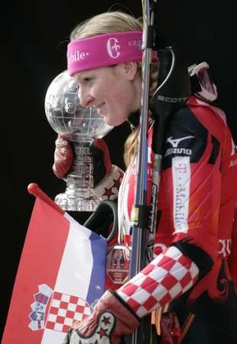
Janica Kostelic World Cup champion. Croatia's World Cup champion Janica Kostelic set a new single-season points record for women after winning the final Alpine skiing race of the season in the giant slalom. 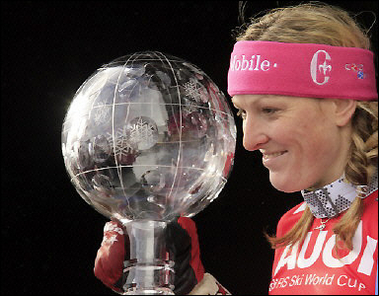
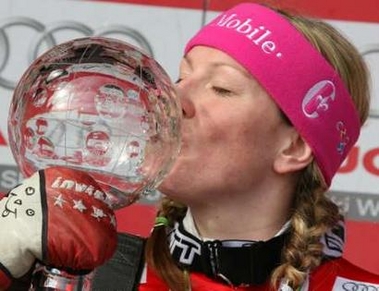
Croatia's Janica Kostelic, left, and Benjamin Raich of Austria hold their Alpine Ski World Cup Overall trophies, at the World Cup finals in Are, Sweden, Sunday, March 19, 2006. (AP Photo/Alessandro Trovati)
|
»
(H) Hrvatske kuglacice na ledu osvojile su zlatno odlicje
|
KUGLANJE NA LEDU, OTVORENO EP: HRVATSKE KUGLACICE OSVOJILE PRVO MJESTO
10.03.2006
Hrvatske kuglačice na ledu osvojile su zlatno odličje na Otvorenome prvenstvu Europe u kuglanju na ledu, koje se odrzalo u zagrebačkome Domu sportova. To je prva zenska medalja za ovaj u nas mladi i nedovoljno poznati sport, do koje su nase kuglačice dosle na najuvjerliviji mogući način sa
omjerom 20:0. Do zlatne medalje hrvatske su reprezentativke svladale po dva puta kuglačice Madjarske, Kanade, Finske, Rusije i Kenije i tako izborile da se sljedeće godine na EP-u u Poljskoj natječu u elitnom A razredu.
Srebro su osvojile Madjarice s omjertom (12:8), broncu Kanadjanke s istim omjerom (12:8), a zatim slijede Finska (10:10), Rusija (4:16) i Kenija (2:18). Nasi seniori nisu obranili broncu u momčadskome dijelu natjecanja u B skupini. Nakon sto su dobili Poljsku i Izrael u drugome krugu su
izgubili od Rusije, Kenije, Finske, Spanjolske, Danske i Brazila te su na kraju osvojili sesto mjesto s omjerom 14:18. Zlatnu medalju osvojili su Rusi (28:4), drugi su bili Danci (26:6), a treći Poljaci (18:14).
Hina/HRTweb sport (vh)
|
»
(H) Upucen poziv za povlacenje potpisa sa Daytona
|

CHICAGO-Sa skupa hrvatske i bošnjačke zajednice u Americi
Upućen poziv za povlačenje potpisa saDaytona Na prvoj zajedničkoj skupštini održanoj poslije 1992. godine,predstavnici hrvatske i bošnjačke dijaspore u Americi i Kanadi zauzeli su stavda je Daytonski ustav neadekvatan za moderno europsko uređenje BiH, te daga treba ukinuti i zamijeniti novim 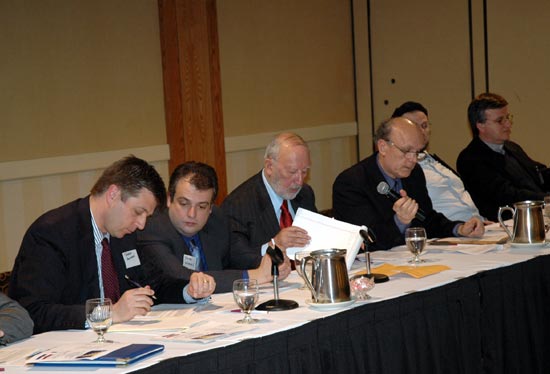
Piše Rudi Tomić
U hotelu Crowne Plaza, Chicago održana je 4. ožujka zajedničkaSkupštinapredstavnika hrvatske i bošnjačke zajednice u Americi i Kanadi, nakojem su bilinazočni čelnici gotovo svih vjerskih i društvenihorganizacija. OrganizatoriSkupa bili su Bećir Tanović, predsjednik bošnjačkogameričkog koordinacionogodbora i dr. Ante Čuvalo, predsjednik Saveza Hrvata BiH u Americi iKanadi.
Na prvoj zajedničkoj skupštini poslije 1992. godine, predstavnicihrvatske ibošnjačke dijaspore u Americi i Kanadi zauzeli su stav da jeDaytonski ustavneadekvatan za moderno europsko uređenje BiH, te da ga treba ukinuti izamijeniti novim. Čuli su se i zahtjevi za ukidanje entiteta jer onipredstavljaju glavnu kočnicu za preustroj ove zemlje i njenokonačno prerastanjeu funkcionalnu europsku državu.
Skup su na početku pozdravili vjerski dostojanstvenici Fra MarkoPuljić,kustos Hrvatske franjevačke kustodije za SAD i Kanadu, te dr.Senad ef. Agić,imam Islamskog centra za Chicago i okolicu, s prikladnim uvodnimriječima odanašnjoj situaciji u Bosni i Hercegovini, gdje se tamošnjim narodimaponovonameće Daytonski koncept demokracije. Pročitane sučestitke i podrške političkihi vjerskih predstavnika iz domovine i dijaspore. Iako pozvani,dužnosnici StateDepartmenta nisu se pojavili na konferenciji. Na skupu je pročitano pismo asistenticepomoćnice državnog tajnika.Ipak, organizatori konferencije pozvani su u američko Državnotajništvo narazgovore o ustavnim promjenama u BiH. Također je važno naglasitida je na ovomSkupu bila otvorena mogućnost i predstavnicima trećeg entiteta- Srbima, da ioni uzmu učešće na sastanku, ali se nisu odazvali pozivu. No,organizatori sunaglasili kako im je ostavljena otvorena mogućnost za sudjelovanjena budućimsastancima sličnih sadržaja.
Tijekom održavanja skupa razvila se živa i zanimljiva diskusija, gdje susudionici uskladili nacionalna i vjerska stajališta, uz potpuno poštivanjeposebnosti svakog naroda. Da je tome tako najbolje potvrđuječinjenica da sudelegati jednoglasno usvojili obe Rezolucije, koje su bile predstavljeneSkupu.
Uz neke tehničke ili gramatičke ispravke, postignuta jesuglasnost, te su ta dva,najznačajnija dokumenta, usvojena i potpisana. U sljedećihtjedan dana,organizatori planiraju poslati pročišćeni
tekst konsenzusom usvojenih dviju rezolucija na adresu StateDepartmenta, ali iu sjedište UN-a i Europskoj uniji. U rezolucijama se traži ukidanjeDaytonskogustava i entitetske podjele BiH na tri
dijela, uključujući Brčko distrikt. Rezolucija ćetakođer biti uručena ipredstavnicima međunarodnih institucija i ustanova, koje su na bilokoji načinvezane uz sudbinu naroda koji žive u Bosni i Hercegovini.
S pouzdanjem je očekivati da će ove Rezolucije rasvijetlitineka pitanja koja sudugo bila potiskivana, s nakanom kako bi se zadržao sadašnji oblikvladavine uzneke manje nužne izmjene. Međutim, svi oni koji budu zaduženi zaoblikovanjemoderne i demokratski uređene države Bosne i Hercegovine, nećemoći zaobićiiznesene činjenice, koje su naglašene u ovim dokumentima i koje suizrazslobodne volje predstavnika dvaju naroda u dijaspori, kao što su biliizraženi ureferendumu 1. ožujka 1992. godine.
U Chicagu je dogovoreno, između ostaloga, da će predstavniciBošnjaka i Hrvatautemeljiti jedno koordinacijsko tijelo, kao savjetodavnu udrugu, koja bivodilaračuna da se među ovdašnjim zajednicama promiče idejameđusobnog prihvaćanja isuradnje, što bi imalo stanoviti utjecaj i na dužnosnike u BiH. Potrebnoje,nakon toliko godina rata i nedaća, da se politika usmjeri premabudućnosti, a neustrajno potenciranje prošlosti, koja je imala tragične posljediceza sve narodena tim prostorima, rečeno je.
Na ovoj konferenciji u Chicagu je sudjelovao i bivši ministar vanjskihposlovaBiH i njen prvi veleposlanik u UN-u Muhamed Šaćirbej, koji je tomprilikomizjavio da želi povući svoj potpis sa Daytonskog mirovnog sporazumajer gaposlije toliko godina počinje osjećati kao moralno ipolitičko breme: “Pozivam iostale potpisnike iz BiH, Harisa Silajdžića, Ivu Komšića, MiruLazovića, tepotpisnike iz Hrvatske, Srbije i ostalih zemalja koji su stavili svojepotpisena Daytonski sporazum, da razmisle o tome”, poručio jeŠaćirbej.
Sudionici Skupa:
Bošnjačke udruge: Bosnian-American Cultural Association, SDAChicago USA forB&H, Bosnian American Information Center, I.A.B.N.A., IslamicCultural Center ofGreater Chicago, ICC Women’s Group, BACA Women’s Group, Congress ofBosniaks ofNorth America, Bosnian Islamic Cultural Center.
Hrvatske udruge: Alliance of Croats of Bosnia and Herzegovina, CroatianFranciscan Custody in USA and Canada, Croatian Fraternal Union of America,Croatian Catholic Union of USA, Croatian Academy of America CroatianAmericanAssociation, National Federation of Croatian Americans, Association forCroatianStudies, Croatian Cultural Association „Napredak“.
|
»
(E) Carla Del Ponte skewed her indictments in favour of the aggressors
|
Carla Del Ponte skewed her indictments in favor of the aggressors
All
The below article is very important and quite
shocking. It is written by someone who worked on the
Milosevic indictment. He alleges that Del Ponte
personally intervened to prevent Milosevic's
co-conspirators from being indicted. The whole piece
demonstrates clearly the political way in which the
tribunal operates.
This piece really should get some press coverage,
coming as it does from someone who worked on the
Milosevic indictment.
Frankly, the ICTY should be closed down at once.
Brian
Comment: Milosevic Death Exposes Tribunal's Failure
The trial itself diverted world opinion from the
court's fundamentally flawed pursuit of justice.
By Marko Attila Hoare (Balkan Insight, 17 March 06)
Slobodan Milosevic was not only the most notorious
villain of the wars in the former Yugoslavia, but also
the only top Serbian or Yugoslav political and
military leader to be indicted by the International
Criminal Tribunal for the former Yugoslavia (ICTY) for
crimes carried out in Croatia and Bosnia and
Herzegovina from 1991 to 1995.
Milosevic's indictments for these crimes speak of a
'joint criminal enterprise' involving other Yugoslav
officials of similar rank and status: Yugoslav
presidency members Borisav Jovic and Branko Kostic;
Federal Secretary of People's Defence Veljko
Kadijevic; Yugoslav People's Army Chief of Staff
Blagoje Adzic; and others.
Milosevic was undoubtedly the single guiltiest
individual, but he was only one member of this 'joint
criminal enterprise'.
In indicting him alone of the top-ranking Serbian and
Yugoslav officials, the chief prosecutor, Carla Del
Ponte, let Milosevic take the rap for his fellow
conspirators, who were let off the hook.
Now Milosevic is dead, none of the guiltiest
Serbian/Yugoslav officials will be tried for war
crimes in Croatia and Bosnia.
To understand why this is so, it is necessary to look
at the command structure of Serbian and Yugoslav
forces during the wars in Croatia and Bosnia, and of
the chronology of these wars.
Milosevic was the supreme operator, but he was on
paper merely the president of one of the Yugoslav
republics - Serbia. He was able to wage war in Croatia
and Bosnia only thanks to the collaboration of other
top officials who were in principle of similar rank
and status to himself.
The Yugoslav People's Army (JNA) was during 1991 in
the hands of Kadijevic, Adzic, and their deputies
Stane Brovet and Zivota Panic.
Their readiness to fight on Serbia's side -
unconstitutionally, illegally and in defiance of the
Yugoslav presidency and government - enabled Milosevic
to enjoy the illusory military superiority that
enabled him to attack, though not defeat, Croatia.
The JNA was formally under the command of the
collective Yugoslav presidency, which during the war
in Croatia was formally headed by a Croat, Stipe
Mesic. But Kadijevic and Adzic allowed the common army
of all Yugoslavia to become the army solely of Serbia
and Montenegro.
In October 1991, at the height of the war in Croatia,
the Serbian and Montenegrin members of the presidency
- Jovic and Kostic, as well as two ciphers
representing Vojvodina and Kosovo - carried out a
coup, declaring themselves the acting Yugoslav
presidency and, consequently, the acting supreme
command of the JNA.
They remained in this role until spring 1992 and were
centrally involved in planning the war in Bosnia,
including establishing the Bosnian Serb army and
picking out an initially minor officer, Ratko Mladic,
to lead it.
Waging war in Croatia and planning and preparing war
in Bosnia were the work of this 'joint criminal
enterprise', as mentioned in the Milosevic
indictments, which included these individuals and a
host of lesser figures, including Milosevic's Croatian
Serb and Bosnian Serb puppets and the colourful but
secondary figures of Vojislav Seselj and Zeljko
Raznatovic 'Arkan'.
All surviving members of this enterprise should have
been indicted and, indeed, nearly were.
The present author worked for the ICTY's Office of the
Prosecutor in 2001 and participated in the drafting of
the indictment of Milosevic for war crimes in Bosnia.
The investigative team for which I worked initially
intended to indict the leading figures of the
enterprise, including Kadijevic, Adzic, Jovic and
Kostic, and had begun work on the preliminary draft of
an indictment.
But at mid-point in this process, we received an order
from Del Ponte, indicating she wanted to indict
Milosevic separately. This decision shamefully let the
other top Serbian and Yugoslav war criminals off the
hook.
Del Ponte's decision pandered to the Western penchant
for personalizing evil. The simplistic understanding
of the uninformed Westerner, in which Milosevic was
the only known figure, while the others had never been
heard of, made it easier to sell her decision to the
Western public.
This decision had more to do with politics than
justice: it would appear that Del Ponte found the
resistance to the ICTY of Serbia's post-Milosevic
regime - in which Milosevic-era war criminals and
mafia continued to dominate behind the scenes - too
tough to risk a further round of indictments of top
officials.
This had nothing to do with an absence of available
evidence. Kadijevic, Adzic, Jovic, Kostic and others
could all have been indicted on the basis of their
command responsibility for crimes carried out by their
JNA subordinates at Vukovar and Dubrovnik, indictments
for which already existed.
Indeed, while Del Ponte was ready to indict the
Croatian Army's chief of staff, Janko Bobetko, for
crimes carried out by his subordinates at the Medak
Pocket, and to indict the commander of the Bosnian
Army, Rasim Delic, for crimes carried out by mujahedin
fighters in Central Bosnia - in both cases on the
basis of command responsibility - she was unwilling to
indict the top JNA commanders and members of the rump
Yugoslav presidency on the same basis.
She skewed her indictments in favor of the aggressors
who conquered large areas of Croatia and Bosnia, and
at the expense of those defending their countries from
the aggression.
Relative to its share of war crimes, the ICTY has
treated Serbia extremely leniently.
The Croatian and Bosnian publics were expected to be
satisfied with the indictment of a single top-ranking
Serbian or Yugoslav official - Milosevic. Now that he
has escaped justice, they must be satisfied only with
a handful of indictees of secondary or lower
importance.
The most important of these is probably Jovica
Stanisic, who headed Serbia's State Security Service,
but although his role in organizing the bloodshed was
central, he was very much a Milosevic subordinate.
Franko Simatovic, who headed Milosevic's special
forces was another creature and subordinate of
Milosevic's.
A third Serbian indictee, Momcilo Perisic, became
Chief of the General Staff of the Yugoslav Army only
in 1993, after the period of direct Serbian aggression
had already ended, having been merely a corps
commander during the JNA attack on Bosnia.
A fourth Serbian indictee, Vojislav Seselj, was a
flamboyant ultra-nationalist loudmouth whose actual
significance in the planning and execution of the wars
was secondary.
Of lesser rank still are General Pavle Strugar,
Admiral Miodrag Jokic and battalion commander Vladimir
Kovacevic, who received very lenient sentences for war
crimes at Dubrovnik, and the three JNA officers
currently on trial for crimes at Vukovar.
Finally, there are the numerous Bosnian and Croatian
Serb indictees, who apparently comprised an easier
target for the chief prosecutor, as they were men and
women of Bosnia and Croatia, not of Serbia or
Montenegro; collaborators rather than aggressors. For
all the huge sums invested in the ICTY, these are
pitiful results. The Croatian and Bosnian publics have
every right to know the bald fact: they have not
received justice
Marko Attila Hoare is a Senior Research Fellow at the
Faculty of Arts and Social Sciences of Kingston
University. He is the author of a short history of the
Bosnian Army (How Bosnia Armed, Saqi Books, London,
2004).
http://www.birn.eu.com/insight_26_5_eng.php
|
»
(E) Letter to Newsweek re: Death of a Monster
|
To: Editors@newsweek.com
Date: Wed, 15 Mar 2006
Subject: Death of a Monster
Dear Editor:
In your otherwise excellent article "Death of a Monster", March 20 issue,
the very first sentence needs correction. It was only in the eyes of the
West that Yugoslavia was viewed, as the journalist states "Yugoslavia
was the freest, most prosperous country in Eastern Europe." No, it was
not free. People who did not agree with communism were imprisoned, many
sent to the "Goli Otok" ("Bare Island") a harsh gulag on an bare island
on the Adriatic, and many were executed. People learned to keep their
opinions to themselves. The West closed its eyes to it all for cold
political reasons of their own, namely to keep Yugoslavia out of the
Soviet sphere. Yet Tito's Yugoslavia vote at the UN nevertheless always
supported Russia and the rest of the Soviet communist Block countries.
And no, Yugoslavia was not "prosperous" because of Tito's "type" of
communism, but because Tito, for the above mentioned reason, received a
great amount of monetary support from the West, enabling him to "employ"
100 workers where 10 could have done the job. Also, much of the
"prosperity" that was seen came from the money sent home to the families
of the Yugoslav "Gastarbeiters" - "guest workers", mostly from Germany.
In that regard Tito was smart, he let people go to work out of the
country, bringing in foreign money and at the same time avoiding mass
unemployment!
Sincerely,
Hilda M. Foley
13272 Orange Knoll
North Tustin, CA 92705, USA
714 832-0289
|
»
(E) Croatia native to compete in spelling - Spahija story
|
Croatia native to compete
The St. Charles pupil is one of more than 70 participants in the annual event.
By HAROLD GWIN
VINDICATOR EDUCATION WRITER
Published: Sunday, March 12, 2006
YOUNGSTOWN - Luka Spahija spoke no English when his family immigrated to the United States from Croatia when he was 4. He's come a long way since then. On Saturday, he will be the representative of St. Charles School in the 73rd annual Vindicator Spelling Bee to be held in Kilcawley Center at Youngstown State University. Luka, 14, is an eighth-grader at St. Charles in Boardman and has come close to winning the school's spelling bee preliminary twice before, finishing as runner-up in fourth grade and again in sixth grade. He won this year's event by correctly spelling plagiarism.
He is one of 73 individual school champions in this year's Vindicator-sponsored event.
Learned English
Luka said he spoke Croatian when he and his parents, Drs. Berislav (Berry) and Mirjana Spahija, came to the United States, but he learned English quickly. He picked up his first few English words within a week and could communicate relatively easily within a year, he said.
Young people tend to be able to master a new language quicker than adults, he said, adding that, at 4, he really hadn't quite mastered Croatian yet.
The fact that he spoke English every day at home with his parents and went to a daily preschool program where only English was spoken helped, Luka recalled.
He learned to read and speak Croatian before English and that may have helped him to become a good speller, he said. Each letter has a singular sound in the Croatian language, unlike
English where letters may have several different sounds.
That Croatian background helps him to sound out a word, he said.
Reading is the key
The most important key to becoming a good speller, however, is to read a lot, Luka said.
"That really introduces you to a variety of words," he said, adding that he finds it more productive than simply trying to memorize a list of spelling words.
Anytime he comes across a new word in something he's reading, he takes the time to look it up in a dictionary. Seeing the word with its meaning and remembering how it was used in a story helps him to remember how it is spelled, he said.
"He's a good boy. He can spell," said his father, adding that Luka's participation in the spelling bee is good for his self-esteem.
His family is proud of him, his father said.
Dr. Spahija is a neurologist, and his wife is a physiatrist, a doctor who specializes in physical medicine and rehabilitation.
Luka has two younger brothers, Roko and Frane, and a younger sister, Marta, at home.
The family first lived in Pittsburgh upon coming to this country. The Spahijas moved to the Mahoning Valley just five years ago, and Luka enrolled at St. Charles. The family now lives in Boardman.
Other interests
Spelling isn't Luka's only interest.
He used to play tennis, basketball and soccer but is concentrating more on tennis now, playing for a local club.
He hopes to play tennis for Cardinal Mooney High School, where he intends to enroll this fall.
Luka is also a major fan of the Pittsburgh Steelers and was elated when they won this year's Super Bowl.
He's not particularly nervous about participating in Saturday's spelling bee. No one's putting any pressure on him, he said.
The winner of the bee gets an all-expenses-paid trip (with a parent) to the Scripps National Spelling Bee in Washington, D.C., a trophy from The Vindicator, a grand champion certificate, a $100 U.S. Savings Bond from Rotary Club of Youngstown, a $100 savings bond from the Downtown Kiwanis Club, a copy of The Vindicator's "These Hundred Years - A Chronicle of the Twentieth Century," the $100 Savings Bond Samuel Sugarman Award, a Webster's Third New International Dictionary, and a floral arrangement from Burkland Flowers.
gwin@vindy.com
http://www.vindy.com/content/local_regional/330161307668137.php
|
|
|